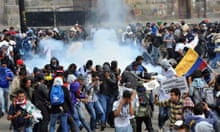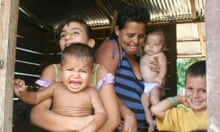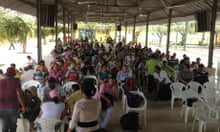At the end of July, I found myself in sitting in the attorney general's office in Colombia. I had spent the previous week travelling across the country with the NGO Justice for Colombia, and the idea was for me to meet the attorney general's office and talk about the things I'd observed – the political prisoners I'd heard about, the state atrocities, the unsolved executions. And so I did: I sat there in unwashed hair and flip flops, a scruffy 5ft tall British writer in a room full of old men in suits, and I talked about the human rights violations I'd seen. The more I talked, the more terrified the men looked. It was like I'd discovered Colombia's dirty secret. They tried to convince me human rights were protected in Colombia. They wanted to give me a presentation which would explain all the things I'd seen. I told them I wanted to write a piece about it for the British press. They looked ashen.
A month later, they gave me the perfect spur to write. This week, the attorney general made the decision to arrest trade union leader and opposition leader Huber Ballesteros; a man with whom I'd eaten breakfast in Colombia, and who was scheduled to be the international speaker at this year's TUC conference in September. Ballesteros, a trade union leader whose life is so endangered he travels everywhere with bodyguards, had been eating lunch on 25 August when he was arrested and detained for "rebellion" and "financing terrorism". These are notoriously trumped-up charges, which have historically been used in Colombia to imprison trade unionists, students, activists, and defenders of human rights.
Ballesteros has been accused of channelling money from human rights organisations, including Justice for Colombia, to the Farc – the leftwing peasant insurgency which the government denounces as terrorists. Justice for Colombia rejects the allegations and says the government is sending a worrying message to the international community about its willingness to tolerate dissent. Having met Ballesteros and witnessed his dedication and how rooted he is in Colombia's social movements and communities, I find the charges highly suspicious.
Although the Colombian government insists the arrest is legitimate, it seems beyond coincidental that it comes at a time when there is widespread protest in Colombia, led by Ballesteros and a committee of nine others. The week before Ballesteros was seized, the country had seen strikes over free trade agreements with the EU and the US, which the protesters say make it impossible for them to make money off their own crops because they can't compete with foreign imports. Free trade agreements don't include any effective human or labour rights clauses, which mean the ability of workers in Colombia to challenge their poor pay, working conditions and so on is virtually zero. Despite its enthusiasm for commenting on humanitarian issues in Syria, Libya and so on, the British government is so far yet to utter a single word on Colombia, even though its own free trade agreement is part of the problem.
Ballesteros has been denied bail and as of yesterday is languishing in La Picota prison in the country's capital. The conditions of Colombia's prisons are notoriously horrendous, and if the stories I heard during my visit are to be believed, he can expect to live with double the population the prison is meant to hold, a total lack of hygiene, rotten food, and no access to healthcare for even the most serious conditions. One of the nastiest stories I heard came from the director of Justice for Colombia, Mariela Kohon, She told me she had met a prisoner in November last year who had literally carved a slice off his face to cut off a tumour.
There are currently hundreds of political prisoners locked up in Colombia, most of which are human rights activists appalled at the country's social problems – such as the fact that it has the highest number of displaced people in the world (10% of the country's overall population), incredible wealth inequalities, or the fact that the army is currently being investigated for nearly 5,000 extrajudicial executions.
Beneath the Caribbean beaches, rum and coconuts, and rich endless countryside lies a damaged and broken nation, where even the most innocuous forms of dissent are punished by the blithe removal of even the most basic rights. As the international media pores over the inhumane actions of the Syrian government, I have to wonder: how bad do things in Colombia have to get before the rest of the world realises there is a problem?


